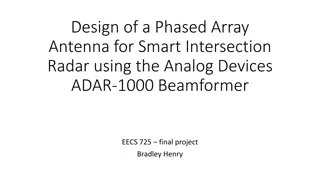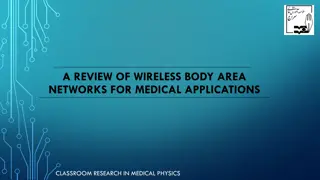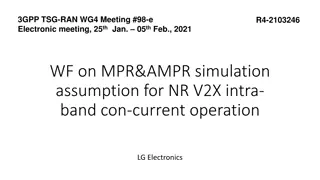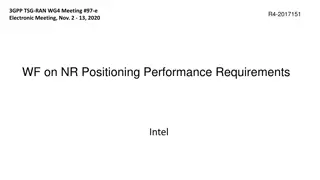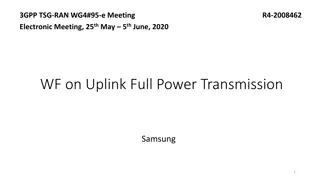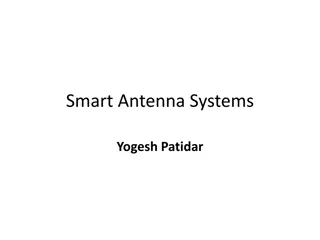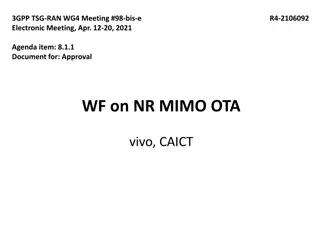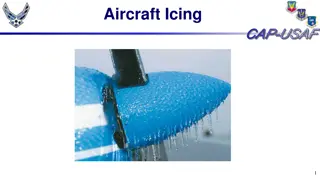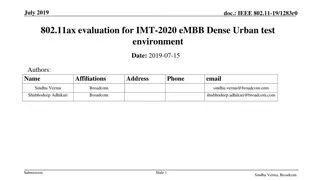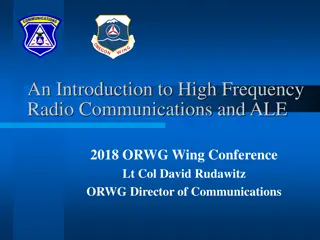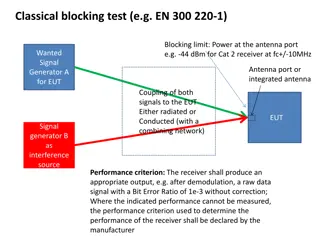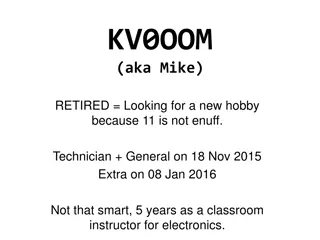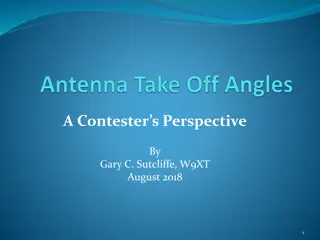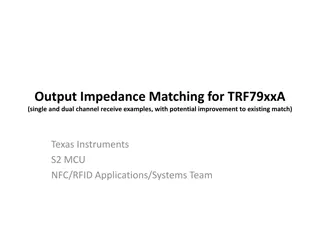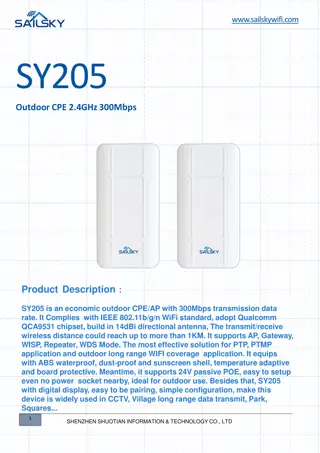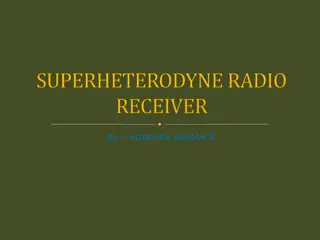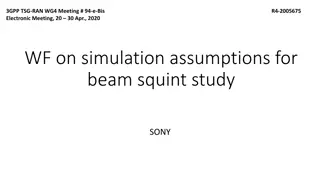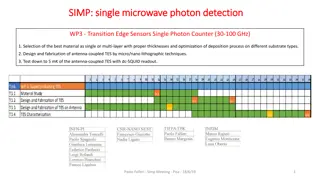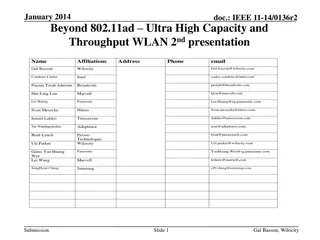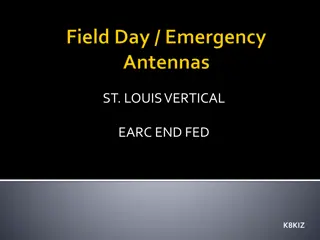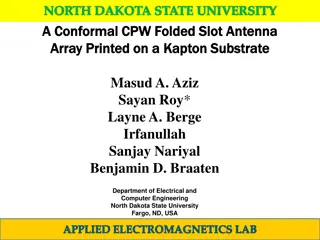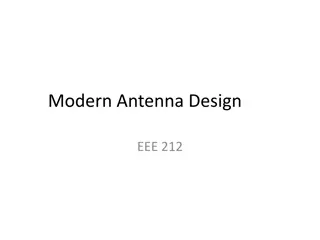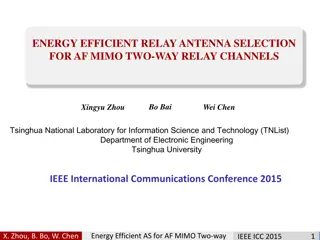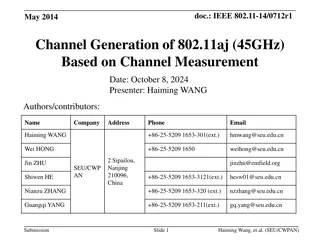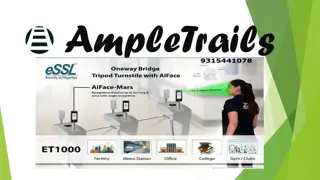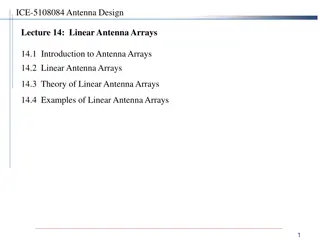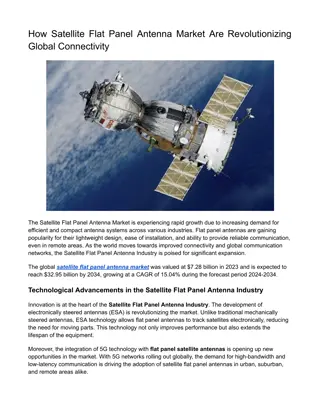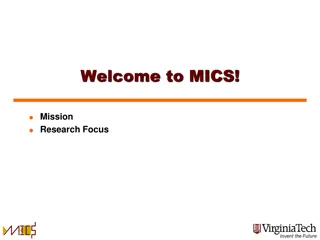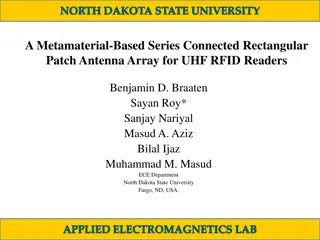Phased Array Antenna Design for Smart Intersection Radar Using Analog Devices ADAR-1000
Designing a phased array antenna system for a smart intersection radar project utilizing the Analog Devices ADAR-1000 beamformer. The system involves 4 independent phased arrays covering key directions in the intersection, with considerations for beam steering, beamwidth, and array configuration. Ke
0 views • 9 slides
Advanced Instrumentation and Diagnostics for Superconducting Magnets at CERN
Explore the crucial needs for instrumentation and diagnostics at CERN, focusing on superconducting magnets. Topics include voltage and strain measurements, vibration analysis, temperature sensing, quench detection, and magnet form factor considerations. The importance of advanced diagnostics and com
1 views • 23 slides
Understanding Antenna Patterns and Directivity of Infinitesimal Dipole Elements
Explanation of the infinitesimal dipole element used in wire antennas, calculation of radiated fields, radiation patterns, directivity, and far-field patterns. Includes illustrations and equations for a comprehensive understanding.
7 views • 28 slides
Understanding Horn Antennas in Microwave Technology
Horn antennas are integral in microwave technology, offering high gain, low VSWR, and wide bandwidth. Widely used for radio astronomy, satellite communication, and more, horns play a crucial role in various applications. Learn about the design, characteristics, and radiation properties of horn anten
6 views • 21 slides
Semi-Automatic Turnstile Gate
Automatic turnstile gates are a common sight in various public places such as train stations, stadiums, airports, and office buildings. They serve as a means of crowd control and security, allowing only one person to pass through at a time. These gates are typically equipped with sensors that detect
8 views • 1 slides
Building a 40-Meter Turnstyle Antenna: Step-by-Step Guide
Learn how to construct a 40-meter turnstile antenna for improved signal coverage using detailed instructions, diagrams, and recommended coaxial cables. Discover the materials needed, calculate dipole lengths, set up the phasing line, and optimize performance for HF frequencies.
0 views • 17 slides
A Review of Wireless Body Area Networks for Medical Applications
Recent advancements in MEMS technology, integrated circuits, and wireless communication have enabled the development of Wireless Body Area Networks (WBANs) for ambulatory health monitoring. This paper discusses the infrastructure, in-body antenna design, low-power MAC protocol, and various applicati
1 views • 23 slides
Overview of RF Architecture and Waveform Assumptions for NR V2X Intra-Band Operation
In the electronic meeting of 3GPP TSG-RAN-WG4, discussions were held on the RF architecture and waveform assumptions for NR V2X intra-band operation in band n79. Various options and recommendations were presented regarding RF architecture, antenna architecture, and waveform definitions for efficient
1 views • 7 slides
3GPP TSG-RAN WG4 Meeting #97-e Summary
The 3GPP TSG-RAN WG4 Meeting #97-e held an electronic meeting to discuss NR positioning performance requirements. Agreements were made in the first round, with discussions ongoing in the second round. The work plan focuses on performance parts based on SA testing, with a detailed WP available in the
1 views • 11 slides
Way Forward for Uplink Full Power Transmission in 3GPP TSG-RAN.WG4#95-e Meeting
Discusses the implementation guidelines and performance requirements for Uplink Full Power Transmission (ULFPTx) features in 3GPP meetings, focusing on Mode-1 UE support, TX antenna connectors, SRS resource transmission methods, and Transparent TxD applicability, emphasizing the existing UE features
0 views • 8 slides
Smart Antenna Systems Overview: Enhancing Wireless Performance
Smart antenna systems, like adaptive array antennas and switched beam antennas, combine antenna arrays with digital signal processing to transmit and receive signals adaptively. These systems improve signal quality, reduce interference, and increase capacity by dynamically adjusting radiation patter
0 views • 20 slides
Approval and Validation Updates for NR MIMO OTA in 3GPP TSG-RAN.WG4 Meeting
The 3GPP TSG-RAN.WG4 Meeting discussed approval for the NR MIMO OTA workplan, addressed FR2 blocking issues, and emphasized the use of polarized antenna models. Updates were made to the power validation procedure and gNB beams usage criteria for FR1 MIMO OTA channel model validation. Collaboration w
1 views • 8 slides
Understanding Aircraft Icing: Risks and Impacts
Aircraft icing poses significant risks by disrupting airflow, increasing drag, and decreasing lift capability. It can lead to structural ice formation, impacting aircraft performance and safety. From affecting antenna vibrations to engine failure, icing can make continued flight impossible and lead
2 views • 37 slides
Evolution of Structural Standards for Antenna Towers and Supporting Structures
The history of TIA-222 and its development through various industry groups led to the establishment of structural standards for steel antenna towers and supporting structures. Starting from TR-116 in 1949 to the latest ANSI/TIA-222-H in 2017, these published standards have evolved to ensure safety a
0 views • 19 slides
Evaluation of IEEE 802.11ax for IMT-2020 eMBB Dense Urban Test Environment
This document discusses the evaluation of IEEE 802.11ax technology in the context of the IMT-2020 Enhanced Mobile Broadband (eMBB) Dense Urban test environment. It analyzes the performance of 802.11ax in meeting the key PHY/MAC metrics required for eMBB Dense Urban scenarios, such as Peak Spectral E
2 views • 13 slides
Understanding High Frequency Radio Communications and ALE
High Frequency (HF) radio communications, specifically using Single Side Band (SSB) modulation, are essential for effective long-distance communication. The components of an HF radio system include a transceiver, antenna, and power source. By utilizing the ionosphere, HF/SSB modulation enables cost-
5 views • 47 slides
WLAN-Based Radars in the 60GHz Band Using IEEE 802.11-19/1854r0 Protocol
Utilizing IEEE 802.11ad/11ay devices, this presentation demonstrates how radar applications can be implemented with minimal hardware modifications, showcasing enhanced radar information accuracy through device collaboration. The advantages of the 60GHz band for short-range radar applications, such a
0 views • 14 slides
Classical Blocking Test and Receiver Performance Criteria
Classical blocking test procedures such as EN 300.220-1 outline limits on power at the antenna port for receivers, with criteria for achieving desired performance levels without errors. Manufacturers must declare appropriate performance criteria for devices, even if certain performance metrics are n
0 views • 6 slides
RFID Market: The Role of AI Integration in Enhancing RFID Capabilities
RFID Market by Component (Hardware (Printers, Antenna, Readers, Labels, Card, Tags, Implant), Software), Frequency (Ultra-high Frequency), Type (Active, Passive), End-user (Transportation & Logistics, Retail), and Geography \u2014 Global Forecasts to
0 views • 3 slides
Exploring Legacy BASIC Programming for Antenna Applications
Retired technician "KV0OOM" aka Mike, seeking new hobby in Legacy BASIC programming with various dialects like GW-BASIC, for working on antenna applications like loading coils, yagi beam pattern design, and more. Learn conversion options, tokenized file handling, and tools of choice for Windows syst
0 views • 34 slides
Understanding Antenna Take-Off Angles for Improved Performance
Exploring the significance of antenna take-off angles in optimizing communication performance, this content dives into patterns, probabilities, and considerations for enhancing signal transmission across various regions. Insights are provided on antenna gain, beam patterns, and the impact of local t
1 views • 36 slides
Anatomy and Characteristics of House Flies
Explore the intricate details of Musca (House Fly) including its scientific classification, mouth parts, aristate antenna, wings, legs, abdomen, and ovipositor. Discover unique features such as the modified labium into a proboscis, halteres aiding in orientation, sticky pads on legs for clinging, an
0 views • 11 slides
Achieving Impedance Matching for TRF79xxA Single Receive Channel Using L Network: Calculations and Simulation
This content discusses the process of achieving impedance matching for a single receive channel in TRF79xxA devices, which operate with a 50-ohm antenna. The calculations involve determining the Q values of the legs, calculating reactances, and deriving the required values for L and C components. Si
1 views • 19 slides
Economic Outdoor CPE/AP with 300Mbps Transmission - SY205
SY205 is a cost-effective outdoor CPE/AP designed for long-range WiFi coverage, supporting IEEE 802.11b/g/n standards with a 300Mbps data rate. Equipped with a Qualcomm QCA9531 chipset and 14dBi directional antenna, it offers a wireless distance of over 1KM. The device supports various modes, includ
0 views • 4 slides
Introduction to Superheterodyne Radio Receiver Circuits
Superheterodyne radio receiver circuits operate based on heterodyne or frequency mixing principles. These circuits involve using a local oscillator to mix the incoming signal with a sine wave, shifting it to an intermediate frequency (IF) for further processing and demodulation. The design includes
0 views • 16 slides
Simulation Assumptions and Performance Degradation Study on Beam Squint in 3GPP Meeting
Background on beam squint in conducted power of transmitted CCs causing radiative domain impairment and gain droop, with a problem statement on degradation of CC2 spherical coverage when CC1 and CC2 are separated by frequency. The study involves refined simulation assumptions to quantify radiative d
0 views • 7 slides
Analysis of Beam Tracking in IEEE 802.11-19/0007r0 Document
The document "January 2019.doc: IEEE 802.11-19/0007r0" discusses the necessity of beam tracking in the 11md draft. It explores whether beam tracking should be mandatory or optional and provides insights into DMG beam tracking procedures for both TX and RX in wireless communication. The document emph
0 views • 11 slides
Research Project on Microwave Photon Detection with Transition Edge Sensors
Investigation and fabrication of TES materials for single photon detection in the microwave range, optimizing material selection, deposition processes, and antenna-coupled TES design. Tasks include materials characterization, antenna simulations, and TES microwave characterization. The project aims
0 views • 9 slides
Beyond 802.11ad: Ultra High Capacity and Throughput WLAN
The document from January 2014 discusses the exploration of modifications to IEEE 802.11ad-2012 PHY and MAC layers to enable modes of operation in the 60 GHz band capable of achieving a maximum throughput of at least 30 Gbps while maintaining the band's excellent capacity attributes. Topics include
0 views • 21 slides
Building the St. Louis Vertical Earc End-Fed Antenna - K8KIZ
The St. Louis Vertical Earc End-Fed antenna, designed by K8KIZ, has a strong reputation among ham radio enthusiasts. Originally utilizing Radio Shack twin-lead, modifications over the years have improved its design, making it easy to set up and operate. The antenna consists of a collapsible pole, PV
0 views • 24 slides
Conformal CPW Folded Slot Antenna Array on Kapton Substrate at North Dakota State University
The study conducted at North Dakota State University involves the design and analysis of a conformal CPW folded slot antenna array printed on a Kapton substrate. The research covers topics such as introduction, background, design guidelines, and measurement results. Various parameters of the antenna
0 views • 19 slides
Overview of Impedance and Reflection Coefficient in 1-Port Network Transmission Lines
Explore the fundamentals of 1-port networks, focusing on impedance, admittance, and reflection coefficient. This lecture from EEE 212 delves into the review of these key concepts essential for modern antenna design. Drawing insights from HP/Agilent Application Note 95-1, the discussion provides a fo
0 views • 140 slides
Energy Efficient Relay Antenna Selection for AF MIMO Two-Way Relay Channels
The study explores energy-efficient relay antenna selection for AF MIMO two-way relay channels, aiming to optimize energy efficiency while maintaining performance. It discusses the advantages and disadvantages of two-way MIMO relay systems, emphasizing higher spectral efficiency, improved reliabilit
0 views • 17 slides
Channel Generation Process for IEEE 802.11aj (45GHz) Based on Channel Measurement
This presentation by Haiming Wang and team from SEU/CWPAN discusses the process of channel realization and generation in the 45 GHz bandwidth. It covers the generation of the channel impulse response, modeling of parameters, statistical measurements, and future work related to the 802.11ad standard.
0 views • 27 slides
Advanced AI Facial Recognition System with Turnstile Features
A comprehensive overview of the advanced AI facial recognition system - AIFACE-MARS, showcasing its unique features such as visible light facial recognition, anti-spoofing algorithms, multiple verification methods, hardware specifications, and integrated one-way bridge tripod turnstile features. The
0 views • 9 slides
Linear Antenna Arrays: Theory and Applications
Introduction to linear antenna arrays, including the concept of distributing radiating elements, combining array elements for specific beam characteristics, and the theory behind linear antenna arrays. Exploring the benefits of linear arrays in obtaining narrow beams, fan beams, and scanning capabil
0 views • 20 slides
How Satellite Flat Panel Antenna Market Are Revolutionizing Global Connectivity
The global satellite flat panel antenna market was valued at $7.28 billion in 2023 and is expected to reach $32.95 billion by 2034, growing at a CAGR of 15.04% during the forecast period 2024-2034.\n\nRead Report Overview: \/\/bisresearch.com\/indust
1 views • 3 slides
MICS Mission Research Focus
MICS focuses on conducting innovative research in integrated circuits, antenna/RF systems to advance knowledge and impact commercial, national security applications. It offers a high-quality educational experience for students to excel in academia and industry. Key guidelines include highlighting im
0 views • 6 slides
Overview of GSA Antenna Outleasing Program
Explore the legislative history, definition, and guidelines of the GSA Antenna Outleasing program, covering authorities applicable to antenna outleasing and negotiated terms for antenna site usage. Learn how federal agencies can facilitate access to rooftops for private sector carriers to enhance mo
0 views • 18 slides
Metamaterial-Based Series Connected Rectangular Patch Antenna Array for UHF RFID Readers
The metamaterial-based UHF RFID reader antenna array comprises features like rectangular patches, inter-digital capacitors, tuning stub, and a series fed array. The prototype dimensions and substrate details are provided along with resonant frequency observations. Test results include S-parameters o
0 views • 15 slides
